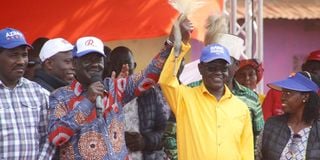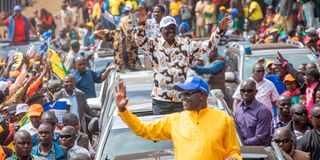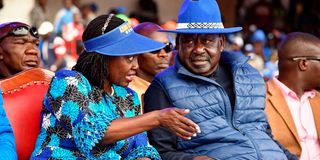Kiraitu Murungi: Jilted lover complex, Railaphobia, led to our poll defeat

Azimio leader Raila Odinga and former Meru Governor Kiraitu Murungi at Kianjai trading centre in Meru County during a campaign rally on July 26, 2022.
What you need to know:
- Campaigns in Mt Kenya revolved around the political fulcrum of what former Vice President Michael Wamalwa Kijana once called “Railaphobia”.
- The campaign was not about logic. Raila had done nothing wrong to them. It was about emotions.
- There was also a strong wave of antipathy against President Uhuru Kenyatta in the region.
Since the election, the political rumour mill has been awash with numerous reasons, excuses, scapegoats and "rational explanations" as to why Raila Odinga’s camp lost many seats, including the Presidency, in the last General Election.
Kiraitu Murungi, who lost in his bid to recapture the Meru governor seat, argues in this thought-provoking piece that it is very easy to blame others and attribute their defeat to external factors, even though some people have pointed out the political confusion, tactical mistakes, ideological errors, organisational disarray, cyber rigging, rampant voter bribery and betrayals that summed up their campaign.
“We were victims of communal punishment”: Village politics is not about abstract grand ideas. No. Voters are only interested in immediate tangible benefits, and the chaos of this campaign has taught us hard lessons about the state of our politics.
It is after long weeks of reflection, agony, self-doubt, and indeed some sadness in my heart that I have decided to give this political testimony.
August 9, 2022 was one of the most hotly contested elections in Kenya’s history.
For me, it was a disaster. We did everything possible to win that election. We did several opinion polls, all of which gave me more than 10 points lead above my opponents.
Our party – the BUS – had the best campaign machinery. We had a well-resourced secretariat and a great team of experienced campaigners.
We mounted an exciting youth-led campaign with the best music and dance. We held unprecedented mammoth grassroots political rallies all over Meru county.
Everywhere we went, we were welcomed by villagers with ululation, song and dance.
Confident of winning
I had contested and won in all six previous elections since 1992. I was confident of winning, as this was the best of all my campaigns.

Former Meru Governor Kiraitu Murungi during an interview at Fortis building in Upperhill, Nairobi on November 30, 2021.
We really enjoyed the campaign. We believed we were winning, even on the very morning of the election.
I was totally unprepared for the loss. What went wrong with our electoral calculations? What led to this unexpected catastrophic defeat? Those are the questions.
Since the election, our political rumour mill has been awash with numerous reasons, excuses, scapegoats and “rational explanations” as to why we lost.
Some have pointed out the political confusion, tactical mistakes, ideological errors, organisational disarray, cyber rigging, rampant voter bribery and betrayal.
It is very easy to blame others and attribute our defeat to external factors. In politics, there will always be those who made mistakes and those who betrayed others.
After my initial shock and disbelief, I slowly accepted that I had lost the election. The loss has fundamentally changed my life, and I have decided not to be angry or bitter and to move on.
I had to have a closure with the past before starting a new journey.
I had to answer to the question: Why did I lose the election? I tried to search for real answers.
I did not do any empirical or qualitative research. It was just my feelings and logical conclusion, an internal debate.
As they say, when the mathematical units are human beings, there are very many variables. Two plus two is not always four.
The following possible explanations have been running through my mind.
We appreciate that elections do not take place in a vacuum. The 2022 General Election took place within our village universe.
Despite many years and millions of dollars spent on civic education, there has been no significant change in our village's political culture.
The villagers’ cultural beliefs and social demands are the principal determinants of political outcomes in rural Kenya. Our political behaviour is controlled by what villagers want.
To win an election, a candidate has to listen and conform to the wishes of villagers.
Campaigns in Mt Kenya revolved around the political fulcrum of what former Vice President Michael Wamalwa Kijana once called “Railaphobia”.
Those of us who campaigned for Raila had a very difficult time.
We thought times had changed and that he would be more acceptable to our people. We were mistaken.
Historical hostility
Most villagers had a deeply entrenched unreasoned historical hostility against Raila. The mere mention of his name re-enkindled the embers of ancient tribal hatreds inherited from the Jomo Kenyatta-Jaramogi Oginga days.
The campaign was not about logic. Raila had done nothing wrong to them. It was about emotions.

Azimio la Umoja leader Raila Odinga, former Meru County governor Kiraitu Murungi with other leaders arriving in Kinoru Stadium, Meru County on June 18, 2022.
I made an incorrect estimate of the situation. I underestimated the psychological impact of the propaganda and political lies that our villagers have been told about Jaramogi since independence.
The villagers had loudly warned me that I was headed in the wrong direction. I refused to listen to the ground, with disastrous consequences.
There was also a strong wave of antipathy against President Uhuru Kenyatta in the region.
Uhuru had been very popular here; he was friendly and informal. His legendary firm, warm handshake was infectious.
During the last two General Elections, our people overwhelmingly voted for him. However, after he won his final term in 2017, he became cold, distant and insensitive.
Unlike William Ruto whose presence was felt in every village in Mt Kenya, Uhuru rarely visited the region.
Even lawmakers could not access him. A very deep jilted-lover complex developed against the President.
Our villagers helplessly stood by in anger and envy as they watched Uhuru frequently commissioning development projects and issuing title deeds to communities that had voted against him.
The deepening rural poverty, severe shortage of money and harsh economic times were blamed on him.
Rejected, shortchanged
Our people felt rejected and shortchanged. The people loved him but he was not there for them.
The historical ethnic suspicions between the Meru and Kikuyus were heightened when Uhuru excluded Meru from the 500-mile Mau Mau roads project which was being implemented in Kikuyu counties.
This caused a strong wave of resentment and a frenzy of hatred against Uhuru and his supporters in Meru.
Uhuru’s closed informal leadership ignored and cut off the traditional social roots of power in Mt Kenya such as Gema chiefs, religious leaders and local politicians.
They had to teach him a lesson. We were victims of this communal punishment.
The historical narrative has been that class politics is not fully developed in Kenya and that the tribe is the dominant mode of political organisation and expression.
For the first time, we felt the signs of a nascent class struggle in our campaigns.
Born at the height of the Mau Mau struggle, I grew up in great poverty in a detention camp, attended rural schools and lived with my peasant parents among the other villagers.
I have always considered myself a champion of peasant interests. I joined politics to liberate our people from political oppression, poverty and social backwardness experienced during the Daniel arap Moi presidency.
During my 30 years in politics as an MP, Cabinet minister, senator and governor, I tried my level best to improve the lives of people in our villages.
I initiated programmes for youth and women empowerment, community development, rural electrification, water and boreholes, and improved agricultural productivity and marketing, among others.
I also did a lot to improve rural education and healthcare.
Development record
Based on my very impressive development record, I could not have imagined that the villagers who had celebrated me could reject me on the ballot.
When I investigated, I found out that there was a strong undercurrent created by my opponents, which painted me as a “dynasty”.
Villagers were told that we rich men were only interested in our wealth and privileges and did not care about them.
There were rumours among mama mbogas, boda bodas and small scale traders that I insulted them and called them chokoras (street children), which was not true.
I was a victim of a sustained campaign of vilification, disinformation, lies and propaganda spewed from social media outlets and local TV stations owned by my opponents.
It created a false narrative that I had ignored and abandoned the villagers.
When I pointed out that my opponents had questionable academic credentials, they accused me of arrogance and insulting villagers for being illiterate and ignorant.
Rivals painted me as an outsider who did not understand the feelings and suffering of the poor. This was not true because I had a powerful social vision for Meru County.
Village politics is not about abstract grand ideas about the future. I had grand ideas. I promised to create a Sh1 billion Women Empowerment Fund and a Sh1 billion Youth Enterprise Fund if re-elected.
Most of our Vision 2040 flagship projects for making Meru great meant little to the electorate.
Voters are only interested in immediate tangible benefits to themselves. They came to our rallies for entertainment and the cash which we were giving for transport or lunch after the meetings.
Money factor
Cynical attitudes towards politicians have reduced village politics, just like in the old Kenya Africa National Union (Kanu) days into one thing – Money.

Azimio la Umoja One Kenya leaders Raila Odinga with Martha Karua during their final rally at Kasarani stadium on August 6, 2022.
Most villagers are in politics for cash. Villagers have perfected the art of political deceit and devised numerous tactics to extract money from the unsuspecting political elite.
Our stories of empowerment of the people fell on deaf ears. Our villagers were more interested in the gumboots, blankets and mattresses which were being given out by my opponent in her rallies.
Villagers who felt abandoned weaponised the campaigns. It was their turn to hit back, to land blows, settle scores and humiliate those who had reportedly ignored them.
It was their time to cheat us and eat our money. Our handouts could not buy their minds and hearts.
As they said, they had to remove the tusks before burying the elephant. My rallies were attended by mammoth crowds of between 6,000 and 10,000 people, most of whom I believe came to collect money.
This was clear from the number of people who followed us on boda bodas from one rally to the next.
Some could attend up to three rallies in one day. Despite this heavy investment, most of these villagers did not vote for me.
I had become part of the “dynasties”, to be milked dry and discarded.
Way back in June 2021, I said that it would be a miracle for the ruling Jubilee to win the 2022 General Election because of the party's internal wars and organisational disarray.
Jubilee had veered off the path. It had become a wild horse. We had been ignored and made political outsiders in Jubilee. We formed the BUS party to ensure that we were not marginalised or excluded in the post-Uhuru political formations.
We joined Azimio with high hopes but it turned out to be equally disappointing.
The Azimio la Umoja One Kenya Coalition, despite having a vast army of political veterans, was opaque and chaotic.
A lot of time was spent behind doors plotting intrigues and managing overblown egos and unrealistic expectations of coalition leaders.
It was captured by the narrow selfish interests of its leaders and their lieutenants, who played their cards in secrecy.
To date, we have never seen the coalition agreement which we are supposed to have signed with them.
Azimio was a shell without a grassroots presence or effective campaign structures.
As Barrack Muluka wrote in The Standard of September 25, 2022, Azimio la Umoja One Kenya lost the election because of internal disorganisation, managerial gaps and mismanagement of funds.
The Azimio campaign machinery was largely dysfunctional. We did not receive any funds to support the campaign in Meru county.
Those who were given the funds used them to campaign for my opponents. Azimio seriously lacked in providing pastoral care for its ground troops.
It did not pay sufficient attention to the nuts and bolts of the campaign. We obeyed the command of the sovereign and believed in his infallibility.
Uhuru’s miracle political tour, which was expected to turn the tables in Mt Kenya, did not happen. We were waiting for Godot. He never arrived.
Outfoxed
We were abandoned on the political battlefield. It is no wonder that we were outnumbered, outfoxed and outperformed by the United Democratic Alliance.
Despite the painful loss, I still feel lucky. No politician is truly free. We are everywhere in chains. We are mentally captured by voters and those who finance our campaigns.
Over the last 30 years, I have accumulated mountains of debt of gratitude to those who supported and voted for me. I have too many personal and social expectations which cannot possibly be satisfied.
I will never have the appropriate words or vocabulary to sufficiently thank family members, friends, campaign teams and “the comrades in the struggle” who sacrificed themselves, their time and resources for me.
They too have undergone untold loss, pain and suffering. It is sad that such political debts will never be repaid.
No words can fully capture the emotions and uncertainties which one experiences after losing an election. After my initial disbelief, I mentally realigned myself to the new realities. One cannot be a hero all his life.
Even Mohammed Ali was finally boxed out of the ring. Public offices are temporary. Public servants must go home someday in one way or another. What I lost was merely an election. I did not lose my life.
Though I have retired from active politics, life is not a one-way street.
I am excited about what the future holds for me. I believe I have many mountains to climb.
The loss has given me a new sense of freedom. I feel liberated from social harassment. I don’t have to do things I don’t like in order to please voters. I thank God I now have the freedom and time to sample the simple joys and sweetness of life.





